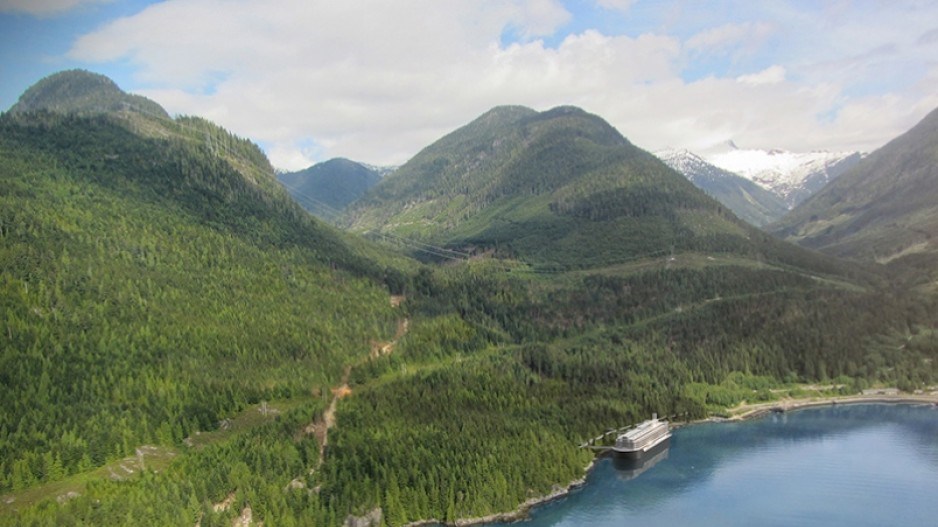The District of Squamish council has raised several questions about Woodfibre LNG's application to create a house its workers in a 'floatel.'
During their meeting on Dec. 10, elected officials commented on what they would like to see included in the District's submission to the Environmental Assessment Office.
After much public backlash against the proposed LandSea temporary work camp in the Britannia area,
Woodfibre announced it would opt to house its workers in a “floatel” moored at the Woodfibre site.
This latest proposal bears resemblance to an initiative in Kitimat where Rio Tinto Alcan brought in a cruise ship to house its workers.
Woodfibre's change in plans requires a change to their application with the province's EAO. As a result, the public was able to comment on the floatel and its associated impacts until Dec. 15.
Councillors raised concerns about housing, accessing health and emergency services, and power, among other things.
Regarding housing, Mayor Karen Elliott raised concerns over language in the application that suggests workers may still be seeking housing in town, despite the floatel's existence.
"I think we have to be clear that we are at capacity in the summer now," said Elliott. "There's no capacity [here] for many months of the year."
The application says the floatel is anticipated to accommodate between 250 to 630 construction workers per month, which equates to about 87% of the construction workers between May 2021 and February 2024.
Also included in the application is the proposed creation of a housing and accommodation adviser who will help workers find a place to stay.
"For the construction period and the initial stage of operations, WLNG requires its EPCM contractor(s) to contract with a person or a firm that will canvass and identify housing and temporary accommodation units and make incoming workers aware of this potential accommodation," Woodfibre's floatel application reads.
"During construction, when feasible, this person will also pre-book hotel and motel spaces within reasonable commuting distance of the project during periods when a higher number of short-term temporary accommodation units are required."
Coun. Chris Pettingill noted that the application says there may be temporary foreign workers helping build the project. He wondered if emergency services will be able to accommodate people who may have to navigate language barriers.
Pettingill asked for greater clarity on the matter, as he said the details weren't hashed out.
The document notes that about 400 "in-migrants" per year will be associated with the project.
Woodfibre's amendment application says the floatel will likely reduce the demand for emergency services in the local area. Minor health emergencies can be dealt with at the site, but the document notes some emergencies may require transportation to town.
"The potential effects will be monitored as per the requirements of the infrastructure and community services plan," the amendment application reads.
Coun. Jenna Stoner noted the amount of access that workers have to town will determine how much of an impact there will be on Squamish's emergency services.
Furthermore, a marine construction vessel — separate from the floatel — is also discussed in the Woodfibre amendment application.
The vessel would help build up the project and would house 150 workers. Electrical power onboard would be generated by diesel.
Coun. Armand Hurford wanted it to change to be entirely electric.
"To me, this diesel — that's unacceptable," said Hurford.
Coun. Eric Andersen also noted that the diesel generators could have an impact on the well-being of nearby wildlife, and that should be accounted for as well.
Coun. John French added he was also in favour of asking for electric power, and said he approved staff's recommended comments on the EAO application.
On the environmentalist front, local activist group My Sea to Sky wrote to the EAO on Dec. 15 that it was concerned Woodfibre gave the impression they only recently became aware of the housing problem in Squamish
“Woodfibre LNG cannot claim with any truth that they are only now aware that accommodation is a problem,” wrote the group’s executive director Tracey Saxby in the letter.
“As a good corporate citizen, Woodfibre LNG could have invested in building legacy housing for Squamish that could help to relieve our housing crisis, and instead they have opted for a cheap, temporary solution. This is unacceptable. “
Saxby also raised concerns about the impact temporary construction workers would have on the community.
She said that consultation on the matter has happened too late and lacked meaning.
“It is only now, five years later, that Woodfibre LNG has begun to engage with the community to discuss these impacts to our health and emergency services, and to be completely honest, the recent stakeholder engagement hosted by Woodfibre LNG that I attended on 22nd October 2019 was a farce, with no meaningful engagement on any of these key issues,” she wrote.
Woodfibre said they welcomed the opportunity to answer questions and receive feedback as part of the process, with the goal of making the project better.
Spokesperson Rebecca Scott said the floatel amendment was “motivated by thoughtful ideas we heard recently when members of the community, including My Sea To Sky, spoke out in public forums and in media to express their preference for a floating accommodation at site.”
Scott said Woodfibre is listening to the community.
“In a consultation process that went above and beyond, the floatel proposal received wide support and some great ideas for improvements,” she wrote in an emailed statement.
“Woodfibre is working to make this the best project it can be, with the final result of over 100 long-term well-paid jobs for Squamish.”




